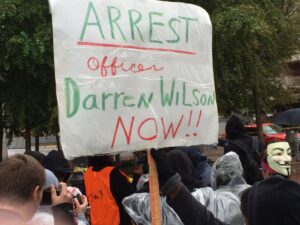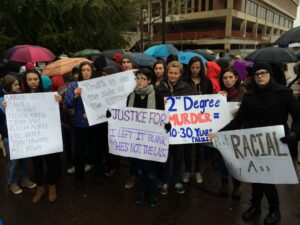 I’ve kept a pretty close eye on Ferguson from here in St. Louis these past two months. After Michael Brown’s shooting, I expected the worst, especially since I was living in a halfway house in the city, just released from federal prison, and knew how enraged people were. My first thought was actually fear for my own safety: that as one of the few white men at the house, I might be in physical danger as a sort of stand-in for the thuggish, white cops imposing terror on the residents of Ferguson a few miles away.
I’ve kept a pretty close eye on Ferguson from here in St. Louis these past two months. After Michael Brown’s shooting, I expected the worst, especially since I was living in a halfway house in the city, just released from federal prison, and knew how enraged people were. My first thought was actually fear for my own safety: that as one of the few white men at the house, I might be in physical danger as a sort of stand-in for the thuggish, white cops imposing terror on the residents of Ferguson a few miles away.
My roommates said things like “Fuck the police,” and “That officer needs to die.” One told me: “If it was my kid, I would go on a rampage.” And to a fair extent the people of Ferguson and even greater St. Louis had themselves one, rioting and looting in spurts right after the killing. If nothing else, the burst of superficial criminality has helped to shine a national spotlight on the City of Ferguson and the more heinous criminals doing work there.
Brown’s shooting fueled weeks of outrage, and the fact that black teenagers are being shot all the time by white cops has once again seized hold of our national consciousness. Amid all this mistrust and racial tension, I decided to take part in the Ferguson October, or a Weekend or Resistance. In a fatal twist to this episode, another shooting occurred on Wednesday. Violence erupted between police and city residents when news spread that yet another black teenager had been shot by a white officer.
“They are gunning down our kids,” the mother of the victim, Vonderitte Myers, said.
This latest killing was still fresh as the Weekend of Resistance kicked off on Friday. First up was the Justice Now March in Clayton, a small city adjacent to St. Louis. Protesters—maybe 200 of them—marched up Forsyth Boulevard into the fancy business district, past the 5 Star Café and Bar Napoli, where St. Louis’ rich and famous cavort, to South Central Street and the Buzz Westfall Justice Center.
It was a dismal, cloudy and rainy day. A couple of the protesters had megaphones and as we approached our destination, I saw the cops lined up in front of the building in their rain gear, guns and batons at the ready. The purpose of the march was to demand that Ferguson Police Officer Darren Wilson be arrested. The diverse, multi-generational crowd was surprisingly peaceful. It seemed there were more people with cameras reporting on the event than actual protesters. The crowd was there to demand that St. Louis County prosecuting Attorney Robert McCulloch indict the officer who killed Michael Brown.
“Michael Brown was a child of God deserving of grace and mercy,” one protester with a megaphone who had traveled all the way from Seattle, Washington for the protests said. He was a slender, bald-headed African American with glasses. “Michael Brown was a citizen of St. Louis. The apathy toward his death is stunning. Every single person in the police department should be ashamed of themselves if they do not understand that he was treated badly. Michael Brown was an American citizen. Michael Brown was a citizen of St. Louis, a citizen of Missouri. Michael Brown was a child of God deserving of mercy.”
As he railed away on the megaphone, the police stood there impassively, rain dripping down their faces, staring down the crowd. Crowd members urged the man on as he continued, “God is ashamed of us. God is not happy with us.” They joined in with him.
“If we can’t get along down here, how are we gonna get along in heaven,” one female protester, decked out in black with her face covered, yelled out. She then raised her fist to the sky in a stature of defiance and solidarity. The man from Seattle continued, “The people want justice. They need that officer to be indicted. They need for him to be brought before a jury. That is all that they are asking. They are tired of people playing politics with their lives. They are tired of Michael Brown’s family being disrespected on a daily basis. They are tired of the people that are sworn to represent us, rather they are the police, the mayor, the council people, talking as if they are absolutely through with justice for Michael Brown. It is a joke. We deserve better. The American people deserve better.”
His speech elicited cries of “What happened if it was your child?” to the police. Others started yelling: “We will fight back, even if we have to die for it.” One heavyset lady yelled to the officers, “Racism lives in your police department. They will not protect you.” A chant ensued, “God bless Michael Brown.” Then with her face covered brought up an even younger woman who had a message for the police officers.
“I’m only 13 and I don’t agree at all with what you guys are doing,” the teenaged Caucasian girl yelled at the police before she started crying and the girl in black consoled her. “Look, you are making her cry. This could be your daughter right here and this is how she feels. She is crying because human life is continually stolen by you pigs,” the girl in black screamed. There were some passionate people there, but they were isolated. It felt more like a wake than a riot. It was very peaceful and I didn’t feel the tension rise all that high.
I started talking to a skinny somber kid named Jacob from Grinnell College in Iowa. He looked barely out of his teens and was the spokesperson for the group of mostly young girls who had a variety of signs.
 “We’re here because we care about what happened in Missouri and Ferguson, but also because this isn’t just an isolated issue.” Jacob said. “Black youth are getting killed in the street right now and there is no response from our justice system, because quite honestly our justice system doesn’t care. The police are getting militarized to the extent that they have antagonistic relationships. I’m afraid when I walk down the street. Not of my neighbors, but of the police, and that is not their job, not what they are supposed to do. I feel fear rather than the fact that they are supposed to protect us and everyone in this group feels the same way. We are afraid.”
“We’re here because we care about what happened in Missouri and Ferguson, but also because this isn’t just an isolated issue.” Jacob said. “Black youth are getting killed in the street right now and there is no response from our justice system, because quite honestly our justice system doesn’t care. The police are getting militarized to the extent that they have antagonistic relationships. I’m afraid when I walk down the street. Not of my neighbors, but of the police, and that is not their job, not what they are supposed to do. I feel fear rather than the fact that they are supposed to protect us and everyone in this group feels the same way. We are afraid.”
There was overwhelming agreement that if local officials are are going to put these heavily armed cops in positions of such immense authority, than they need to have appropriate training and be able to handle high-pressure situations.
“They kill hundreds of people every year,” Jacob said. “What more is it going to take? When is it going to stop? That is why we are here. We want to get the word out.” Chants of “No Justice, no peace!” started behind us and drowned out everything. Some in the crowd started dancing in the rain with their umbrellas, breaking into songs and different chants. “Hands up, don’t shoot,” a group of protesters starting yelling. They were all decked out in blue Hands up, Don’t Shoot t-shirts.
“I got my hands on my head, please don’t shoot me dead,” a mixed group of African American women and men sang, dancing and placing their hands on their heads as they moved in the rain. “The whole damn system is guilty as hell. Indict that bitch, send that killer cop to jail,” the crowd railed. “Whose streets, our streets,” was another chant, recalling Occupy Wall Street.
The rest of the weekend went off in the same fashion, even though it jumped off at Saint Louis University on Sunday night. There was nothing violent at all. There was a report out that the protesters were monitoring the activity of police officers and posting their movements on social media, and while this was true, there wasn’t any coordinated strike against the police. To me it seemed like the protesters were on their last legs. They were protested out. Not to belittle what they are doing—their civil disobedience is commendable. But if the numbers were any indication, it seemed like the anger was beginning to subside.
It’s been reported that event organizers claim prosecuting attorney Robert McCulloch cannot be impartial in the grand jury investigation into the death of Michael Brown because his father was killed in a shootout with an African American in 1964. As the demands for the indictment of Officer Darren Wilson rang out this weekend, the protesters were a mixed and diverse group, people from all walks of life. And in the end isn’t the media making more of this then it really is. Not to detract from the death of Michael Brown and the situation that occurred. Truly tragic but to me the whole episode has seemed like everyone is waiting for a train wreck to happen and we all just want to be there when it occurs. Is that what the legacy of this death and the subsequent fall out should be? Or should we try to come to a better place and understanding of it all so that black teenagers are not been shot down in the street?


